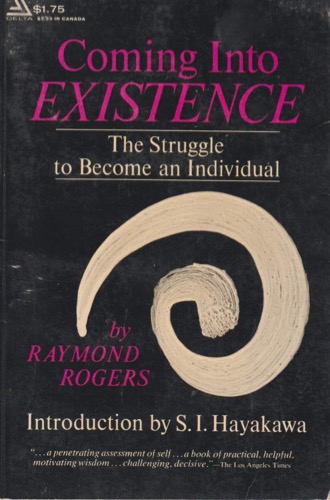Coming into Existence

Rare & Out of Print.
Published in 1967. Written by Raymond Rogers.
Commentary: This book was written before there was a 'self-help' category of books. It is considered one of the earlier 'new age' works. I don't believe the word self-help exists in the book at all. Instead, the author introduce the concept as a 'third force' in psychology. It was inspired by the writings of Prescott Lecky.
What follows is a sample from the book. You can also read more of my thoughts on existence.
A Self-Active Unity
Play & Progress
The process of shaping and unification does not take a particular direction. It takes just any direction in which it happens to start, but a definite direction. Definite methods of coping with the environment are developed-methods which will be difficult or impossible to change after general awareness is achieved.
The self commits itself to various techniques of behavior before it knows what it is doing. During spontaneous below-awareness activity the self is engaged in putting together the framework and skeleton of its own permanent structure.
This spontaneous unthinking activity is of course what we call play. Although its meaning is not generally understood, childish play is easily as significant as any activity that the self ever undertakes.
It is uniquely valuable because it is so completely undirected, random, and exploratory. In early play the self finds by trial and error the unities that suit it best, the approaches to environmental difficulties that it can use most effectively, and discards the possibilities that are unsuitable or unworkable. Because this early activity is hardly supervised at all by awareness, because it is almost entirely free of purposes and preconceptions, it is the ideal means of self-exploration. But it is bothersome to parents.
This is the time when children “get into things," do damage, and cause trouble. It is therefore the time when they are put into play pens and otherwise immobilized and deactivated. And so the processes of self-discovery and self-integration, instead of being guided and assisted, are often slowed down just when they could be most effective.
Although self-integration is slowed down, it is not stopped entirely. Sooner or later, gradually or suddenly, almost everyone achieves a level of unity that is marked by his first general coming-into-awareness experience. These experiences are of unique importance, but they are structurally quite similar to other more commonplace experiences. Coming into existence is like the surprise of getting the knack, after long and discouraging effort, of bicycle riding or roller-skating. After many painful falls, after trying many different but futile approaches, one suddenly finds himself rolling along smoothly, in balance, on the bicycle or the skates.
At the moment he learns to do it he finds himself already doing it.
Similarly, at the moment one learns to cope with life's ambiguities he finds himself already handling them effectively. He discovers himself at the same moment he discovers his surroundings and certain constructive relationships already established with his surroundings; all this emerges in one flash of enlightenment.
He will become able to establish better relationships with his environment later, but the ones he finds already established are functional and serviceable.
The reason we assign so much importance to reaching these levels of increased general awareness is that they always make possible new dimensions of self-activity which enormously increase the self's power and efficiency.
When the self achieves awareness, it can look ahead and see where its spontaneous activity is taking it. Aware self-activity can be purposeful; it can become future oriented and work toward goals. It can be selective, choosing to attack some problems and avoid others. It can be deliberate; thinking can become reflective and calculating.
Awareness makes it possible for self-activity to refine itself and become generally more powerful. From our point of view its most significant effect is to increase the efficiency of self-integration. The unifications that are achieved with the help of deliberation are much more elaborate and versatile than the earlier ones which were built in almost pure spontaneity.
We have now cleared up those paradoxes of psychic birth that we were puzzling over a while back. We have explained them all by using the concept of the self as an organic unity whose entity is directly related to its self-activity, increasing or decreasing with self-activity. To summarize, psychic existence is the same as self-awareness. Fighting one's way into existence means struggling toward self-awareness; carrying on below-awareness activities which increase self-unity.
Being already in existence before the struggle starts means having a nebulous unity which has been created through spontaneous.